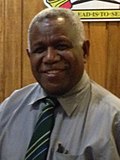| Prime Minister of Solomon Islands | |
|---|---|
| Praem Minista blo Solomon Aelan (Pijin) | |
 Coat of Arms of Solomon Islands | |
| Residence | Red House, Honiara |
| Appointer | Elected by the members of Parliament |
| Term length | Until next election |
| Inaugural holder | Peter Kenilorea |
| Formation | 7 July 1978 |
| Salary | 143,000 SBD/US$ 17,439 annually [1] |
 |
|---|
| Constitution |
The prime minister of Solomon Islands is Solomon Islands' head of government, as elected by the National Parliament. Since May 2024 Jeremiah Manele has been the prime minister of Solomon Islands.
Contents
Solomon Islands is a Commonwealth realm; the functions of the head of state are performed on behalf of the monarch of Solomon Islands by the governor-general of Solomon Islands, who is nominated by Parliament.
The prime minister's official residence is Red House in Honiara.












